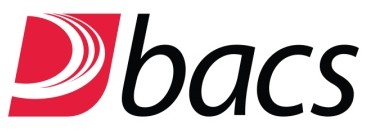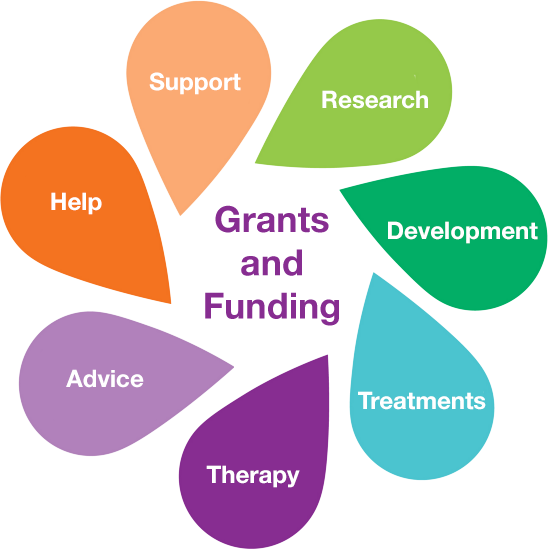November 2019
ADDOR is pleased to announce an additional grant made in support of the continued fight against Huntington’s disease (HD), by providing further financial assistance to help an HD sufferer Alan Pagett and his family.
Alan & Dianne (Di) Pagett
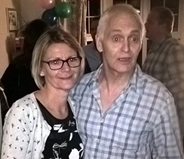
In October 2019 ADDOR made a grant to help Alan, Di Pagett and their family. Alan sadly not only has a terminal brain tumour but also has Huntington’s disease (HD). The family are suffering severe financial hardship from the impact of living with HD, despite Di working overtime to try and pay her way. Di is also responsible for debts arising from Alan’s business bank overdraft, which is an additional burden on the family.
Di was extremely grateful for the original grant in October but in desperation reached out to ADDOR to see if we could further help the family.
ADDOR is very pleased to provide an additional grant of £200 to Alan and Di to help them at this difficult time.
If you would like to help us in the continuing fight to defeat HD, fund research and help other sufferers and their families, like Alan and Di please donate using the PayPal buttons at the top and bottom of this site.
October 2019
ADDOR is pleased to announce a further grant in support of the continued fight against Huntington’s disease (HD), providingfinancial assistance to help an HD sufferer Alan Pagett and his family.
Alan & Dianne(Di) Pagett Story

Every story told to ADDOR by family and carers of sufferers, living with HD, is sad and tragic. Alan and Di’s story is the most emotional heart breaking situation we have encountered.
Alan and Di met on holiday in Ibiza, in the 1980’s and spent 18 months travelling between their respective homes, keeping their romance alive, before Di moved from Bedfordshire to Somerset. They married shortly afterwards.
Alan is now 65 years old and lived with Di in Axbridge, Somerset. Three years ago Alan collapsed with a seizure and after a scan at the Musgrave Hospital the family were told, he had a glioblastoma brain tumour. Alan was then transferred to the Southmead Hospital, Bristol for assessment and prognosis. The Doctors at Southmead said without surgery Alan had three months to live but they could partially remove the tumour and with chemo and radiotherapy, hopefully prolong his life for 13 months!!!
During the visit, an attending nurse noticed Alan’s twitching movements and mentioned to Di that she felt that he may have HD. As a patient needs to remain still whilst having radiotherapy, medication was prescribed to control his movements to ensure a successful procedure. A blood test was also undertaken, the results some 6 weeks later confirmed Alan also had Huntington’s disease.
This was shattering news to a family, trying to come to terms with the brain tumour diagnosis. Di who had helped care for an HD sufferer in the past, understood the devastating impact for someone living with HD. Looking back, she realised that certain health issues Alan had previously suffered from, could have been due to the onset of HD. 10 years before Alan had broken his shoulder and both collar bones after unexpected falls at work and when playing football.
Which side of Alan’s family he inherited the HD gene from, is not certain, as his father died of a heart attack some years ago. However Alan’s mother who is 87 and in a residential home, has shown some of the characteristic symptoms of HD, with her lack of co-ordination and she has suffered a number of falls. Doctors are reluctant to do blood tests to check for HD, with a lady of her age, concerned as to how she will react and worried about possible confusion, if she is given counselling. It is highly probable that Alan’s mum, carries the defective gene.
Alan has two siblings, his sister has been tested for HD and thankfully she does not carry the gene. His brother, as yet, has chosen not to be tested.
Alan and DI have three children, Vicki 37, who has MS and is reliant on a very expensive drug to help her cope with her condition. Stacie 34 who is married, with two children Pippa 5 and Jude 2. Son Joseph, who with his partner, have a daughter Sienna 3 and a recent addition with the arrival of a little boy, Finley.
When I first spoke with Di, she said “at the present moment the children are extremely worried about having the blood test to confirm, whether or not they have inherited the HD gene, for myself I would want to know”. Attempting to alleviate Di’s concerns and anguish over this decision, I said “for me there is no right decision, the decision to test or not has to be a personal one, made within your own feelings and circumstances. Daniel, my grandson chose to be tested and it was confirmed he had the faulty gene. He is showing strength and courage in facing the reality of his future. Others tested have been unable to cope with the positive result and in some cases, taken their own lives. Nancy Wexler 74, who heads the Huntington’s disease Association (HDA) in the USA, her mother and other family members died from Huntington’s related diseases, she and her older sister Alice, decided not to be tested. My words may not have calmed Di’s worry, but they seemed to give her a measure of comfort.
Di went on say “Alan worked as a self-employed plasterer and general builder. He was a very fit active man, loved playing football and enjoyed a game of skittles or darts in the local pub. We have been married for 36 years and I can’t imagine my life without Alan. I tried very hard to keep Alan at home, with two carers visiting daily to enable me to carry on working, however he began to suffer frequent falls and after a three week period in hospital, when he became more immobile, the only option was to get him the needed specialist help and move him into a care home. Alan is now resident in the St Michael’s Cheshire Home in Axbridge, fortunately this is literally 2 mins away from me in the car. He now has one to one specialist care, 24 hours a day”.
She continued “our lives, until now, have been happy, with so many wonderful memories, but my future does feel like it will never be the same, as I watch my husband deteriorate daily and every time I see him, he looks so sad. He was and still is the very lovely man, I met, fell in love with and married and everybody loves him”.
Our conversation was very emotional, for me because of my grandson and understanding what Di is going through. For Di, it was coming to terms with her husband’s imminent demise, trying to cope with the everyday strains of family life, making sure she visits and spends time with Alan every day, keeping on top of her job, concerned she might lose it, worried about her family, her daughter with MS, the children’s fears of living with the HD ticking time bomb and the potential risk to their children and her grandchildren. There are other problems, Alan was refurbishing the family home, before he became seriously ill, that work is in-complete and there is much still to be finished, the flooring needs to be fixed, the boiler is not working, the only hot water available is from the electric power shower. In addition Di is at a financial crisis point, as she is co-signatory to the Business Account, Alan had with a bank. As a result she is now responsible for the outstanding overdraft debt on the account and must pay this off. The bank does not help her situation, adding unnecessary pressure by pushing for the monthly payments before the agreed due date. If Di had not been a co-signatory, when Alan went into the Care Home, the debt would have been cancelled. Di said “I am at my wits end, with the stress and daily pressures of life”, struggling to come to terms with, as she put it “living with the impact of this cruel and heartless disease.”
Di’s local HDA Special Adviser Shirley who initiated the request to ADDOR for a grant wrote “I have a family that would greatly benefit from financial help. The gentleman, Alan shortly after a scan showing he had a brain tumour, was diagnosed as having HD. He is terminally ill and been moved into a Nursing Home to provide the 24 hour specialist care needed.
His wife is amazing. She works fulltime caring for adults with learning difficulties and visits Alan for several hours every day. Unfortunately they still have a mortgage. Before Alan was taken ill he had been doing work on the house until he became too unwell to carry on. There is lots of unfinished work and although Di has had help from friends, she does not wish to ask too much of them. Di is currently having to work more hours to pay the mortgage and utility bills.
When I speak to Di she naturally becomes emotional, is upset and stressed most of the time but still somehow manages to hold it together to visit Alan and to go to work. Many people would have taken time off work but she is a hardworking lady dedicated to helping people. She is always grateful for visits and a listening ear.
I would be very grateful if this family could be considered for a grant to help financially, possibly a respite break.”
When ADDOR advised Shirley we were giving positive consideration to the request she wrote “Di is overwhelmed with emotion that she is being considered for a grant to help her.”
Di herself wrote “thank you for contacting me, I know from our conversation that you totally understand how I feel.”
ADDOR is very pleased to provide a grant of £500 to Alan and Di to help them at this difficult time. We only wish we could do more.
When ADDOR confirmed the grant, Shirley wrote “Thank you so much for your kindness to Di, Alan and their family. They are a remarkable couple coping incredibly with all the challenges that face them. This will mean so much to them.”
Di herself responded “O my god you will never know how you have helped me. You are my guardian angel, I’ve literally got no funds until I get paid next Friday. I am so grateful, again thank you so much, I am crying with gladness”.
ADDOR is merely a conduit, the guardian angels are our donors without them we could not carry out our work.
In conclusion it is hard to see how the family cope, hold themselves together and remain positive at this time. Sadly Alan has only a short time left, living with his terminal illness. It would certainly be a kind “caring in the community” gesture, if the Bank cancelled the Business debt to help his family. ADDOR wishes Di and her family well and if we are able to again help in the future, we will do so.
If you would like to help us in the continuing fight to defeat HD, fund research and help other sufferers and their families, like Alan and Di please donate using the PayPal buttons at the top and bottom of this site.
ADDOR Grants
May 2019
ADDOR is pleased to announce their first grant in support of the continued fight against Huntington’s disease (HD), by providing financial assistance to help an HD sufferer Tony Simpson.
Tony Simpson
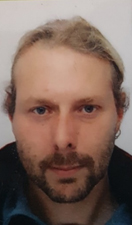
Tony is 50 years old. He inherited HD from his father, who had kept his condition secret, until 3 years before his death in 2005. Following the disclosure that their father had HD, Tony and his elder sister Jane decided, in 2003 to be tested together on whether they had inherited Huntington’s disease (HD), sadly they were both diagnosed positive.
Tony is one of 4 siblings, 3 have inherited HD. Tony’s sister Jane sadly passed away in March 2016 aged 49 leaving two children, who may develop the HD condition in time, we pray not. It was extremely difficult for Tony watching his older sister struggle with this crippling disease and die, so young, knowing that this is his fate, unless a medical breakthrough is made soon.
The third sibling Mike, who lives in Wales, is 10 years younger, he is now struggling with the onset of the HD symptoms.
Tony worked hard all of his life, never being late or off sick from work. He was super fit, rock climbing, cycling and running. He completed the London to Brighton bike ride in just over 4 hours. He still tries to keep fit on his home exercise bike, completing 10 miles in 31 minutes.
Tony lives in Weymouth with Dawn, his partner of 26 years. As Dawn, who is also his carer says “we’re not married because he doesn’t want to rush into things”, “He loved to ride his motor bike with me being a very bad passenger on the back”. She added “his balance, co-ordination and speech are now on the decline, but he still does his best”.
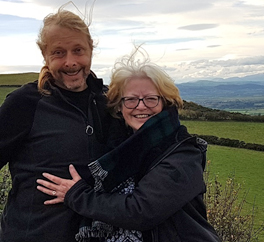
The couple had planned to go on holiday to the Canary Islands, at the end of January this year. However, whilst travelling to Gatwick airport, they were caught up in a major incident on the M25 motorway, delayed for over 4 hours and missed their flight. The insurance company refused to compensate them, as they were travelling by taxi to the airport. Unbelievable!!!! For a couple living on benefits it was a catastrophe, not only emotionally, from missing out on a long-awaited break together, but financially. They are still fighting that decision, which is now with the Financial Ombudsman. Let us hope they are successful in their fight for compensation.
Dawn in a message to ADDOR, said “We love each other now as much as the first day we met. In my eyes he is being extremely brave and strong. This is breaking my heart to see him like this, but he's stuck with me, through thick and thin.”
Two years ago IONIS, the pharmaceutical company, spent two days with Dawn and Tony, filming their day to day life with HD. IONIS were given permission to show the video at lectures and drug conventions. With Dawn and Tony’s permission ADDOR hopes in the future to be able to provide a link to that video to share their experience.
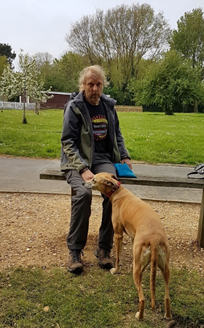
ADDOR is very pleased to provide £500 to Dawn and Tony to share time away together.
Dawn & Tony’s responded “Thank you so much for your call. From a complete stranger, it comes as a wonderful surprise”.
If you would like to help in the fight to defeat HD, fund research and help others like Tony and Dawn
Please donate at addor.co.uk
Grant for research project
ADDORis pleased to announce their second grant in support of the continued fightagainst Huntington’s disease (HD), by donating to a research project being undertaken at University College London (UCL).
Donation toUniversity of London (UCL)
In December 2017researchers at the UCL and IONIS pharmaceuticals, partnered with Roche,released the top level results on the exciting breakthrough in the fightagainst Huntington’s disease (HD). Moredetailed information from their announcements can be found on the ADDOR websiteat addor.co.uk
Summary
For the first time. Using an experimental drug, injected into spinal fluid, the levels of toxic proteins in the brain were safely lowered.
The research team, at UCL said“there is now hope the deadly disease can be stopped”.
DNA is the key to all life, with genetic information stored in regions known as genes. Everyone has two copies of each gene. In Huntington’s disease an error, known as mutation, effects one of the Huntington’s genes. This gene produces a protein called Huntingtin, which plays a key role in maintaining neuronal and brain cells healthy. When the protein is faulty it destroys the cells and leads to devastating mental and physical symptoms with sufferers requiring 24 hour care and often passing away before 50. The IONIS-HTTRx treatment is through a process called ‘Gene silencing’ where the drug can specifically target the faulty Huntington’s gene, stopping the production of the faulty protein and correcting the disease.
Prof Sarah Tabrizi, the lead researcher and director of the Huntington's Disease Centre at UCL, said "For the first time we have the potential, we have the hope, of a therapy that one day may slow or prevent Huntington's disease. This is of ground breaking importance for patients and families."
Doctors are not calling this a cure. They still need vital long-termdata to show whether lowering levels of huntingtin will change the course of the disease.
In April 2019 the full details of the trial were presented to scientists and the exciting results of HDF-Supported Research were published in the NewEngland Journal of Medicine.
The President of the Hereditary Disease Foundation, Nancy Wexler exclaimed “we are ecstatic by this very encouraging news!”
The first human trial, which uses a novel approach to lower the level of the devastating huntingtin protein in the nervous system, is a success. The drug targeting the cause of Huntington’s was safe and well tolerated.
Nancy Wexler said “we are excited that we will now be moving forward to a global Phase 3 trial sponsored by F.Hoffman-LaRoche, which licensed the medicine. HDF has supported this promising therapy for the past decade”.
Full information regarding the published articles are available on the following links and through the ADDOR website.
Read the article online or click here for the PDF.
Read the editorial online or click here for the PDF.
View supplementary appendix online or click here for the PDF
ADDORis supporting this research effort by providing a donation of £500 and plan tomake further donations.
If you would like to help in the fight to defeat HD,fund research and help HD sufferers.
Please donate at addor.co.uk
August 2019
ADDOR is pleased to announce their latest grantin support of the continued fight against Huntington’s disease (HD), byproviding financial assistance to help an HD sufferer Mick Johnston.
ADDOR is pleased to announce their latest grant in support of the continued fight against Huntington’s disease (HD), by providing financial assistance to help an HD sufferer Mick Johnston.
Mick & Mary Johnston story
Mick Johnston, 66 years old, lives with his wife Mary in Kilkeel, a fishing village, as Mary put it “in the beautiful Mountains of Mourne, area of Northern Ireland”. Mick was diagnosed with HD in 2001, although Mary said “certain signs were there before, but were not at the time attributed to HD”.
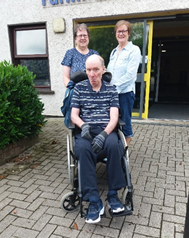
He inherited HD from his mother. His grandfather, an uncle and an aunt, also had HD. There were two siblings in Mick’s family, fortunately both his brother and sister did not inherit this cruel disease.
Mick joined the Army Junior Leader’s at the age of 15, serving for 24 years, with much of that time spent in Germany. He was an extremely fit active man, who was a keen swimmer in his younger years. Both Mick and Mary share a love of the great outdoors.
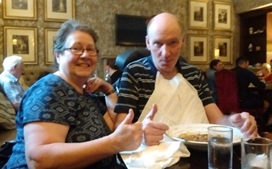
On leaving the Army in 1993, Mick and Mary moved to the Lothian area of Scotland, where Mick worked in the motor trade, until retiring through ill health in 2005. During their time in Lothian they were active members of the Lothian Family Branch of the Huntington’s Disease Association (HDA), Scotland, with Mary being the Branch Treasurer for eight years.
In 2016, with the worsening progression of Mick’s HD, they decided to move to Mary’s birth place, Newry, where more family support is available to them. Since starting to live in Kilkeel, they have joined and are active in the Newry Support Group of HDA, Northern Ireland
Mary is the main carer for her husband Mick who is now in a wheelchair, has lost his speech and relies on 24 hour care, mostly from Mary, although more recently, there is additional carer support provided, 4 times per day.
Mary drives a van fully adapted for the wheelchair, which enables them to get out together.
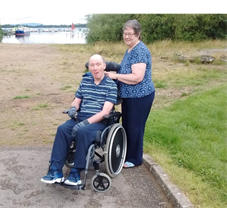
Mick and Mary do not have any children, they decided, because of HD in the family, not to risk having children. As Mary said “although there is disappointment in not having children, we are blessed, because, from my brothers and sisters, we have an extended large family of 24 nieces and nephews in the UK and America, which more than fills that void.
Mary has been hoping to take Mick away for a few days for a short break, somewhere he can enjoy being outdoors, but also has wheelchair accessibility, which has been huge barrier to lots of their planned outings. A few days at the Share Centre (a registered charity outdoor adventure centre in Co Fermanagh) seemed ideal. She would like to take her sister Margaret with them for extra support. However money is very tight, for them to be able to afford this break.
HDA Northern Ireland (HDANI) Chief Executive, Sorcha McPhillips in respond to ADDOR’s offer to help, said “We have a lot of very deserving cases, but the offer is timely to provide a respite break for Mick and Mary. Northern Ireland is very limited in terms of wheelchair accessible, affordable holiday options and the vast majority of the families we work with are benefit dependent. This couple would be ideally suited to a grant to help them enjoy safe, quality respite time together. We would be most grateful if you would consider them for assistance”.
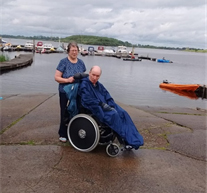
ADDOR was extremely pleased to provide a grant of £500 to Mick and Mary to spend quality respite time away together.
In early August Mary and Mick enjoyed a lovely few days away, in Lisnaskea, Co Fermanagh, on the edge of Lough Erne, with Mary’s sister Margaret.
Mary during one of our telephone conversations said “you are a guardian angel“. Their Specialist HDA Adviser Angie wrote “thanks again to yourself and all the trustees, what you are doing for HD families is incredible, this lovely gesture of support will make a positive difference to Mick's quality of life”.
These gracious words of praise give us at ADDOR great pleasure, to know we are helping, but really belong to you, our donors, for your continued financial support, without which, none of this is possible.
ADDOR applauds and supports the tremendous work of the HDA Support Groups and the HDA Specialist Advisers, which is of such extreme importance to HD sufferers and their families.
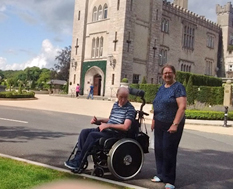
If you would like to help in the continuing fight to defeat HD, fund research and help other sufferers and their families, like Mick and Mary
Please donate at addor.co.uk
